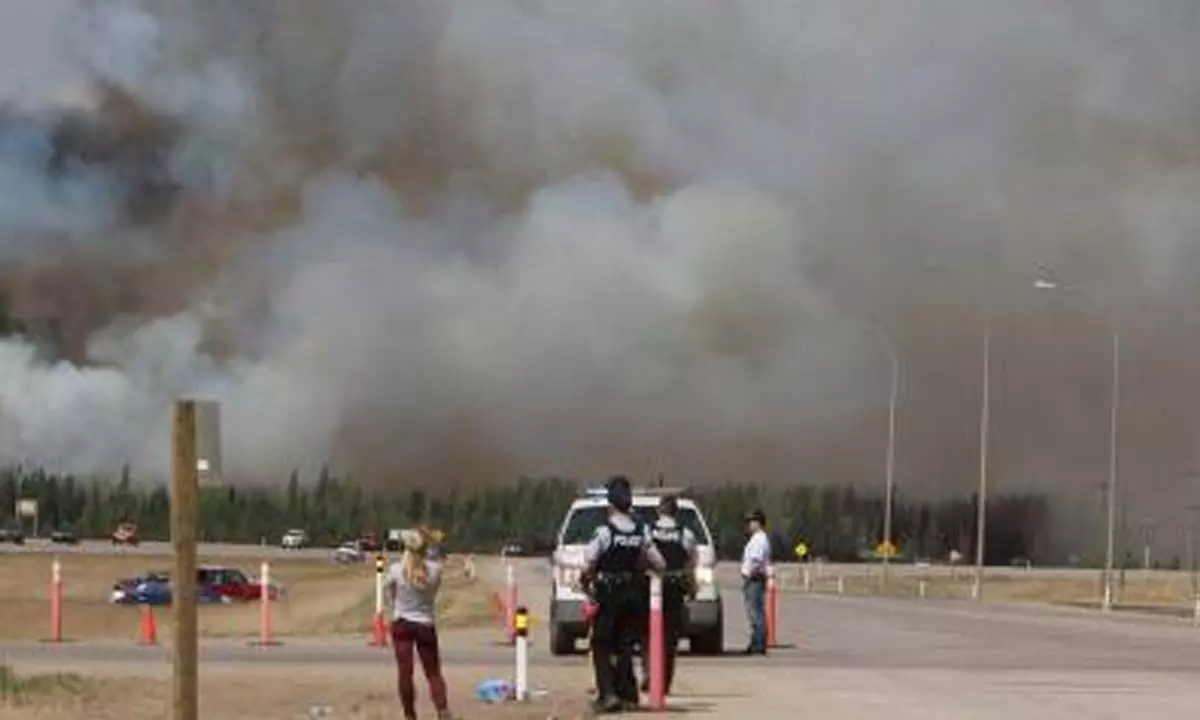Wildfires scorch US' Hawaii, Canada, Spanish island, causing heavy losses
Share :

Wildfires scorch US' Hawaii, Canada, Spanish island, causing heavy losses
Wildfires that raged in the US state of Hawaii, Canada and a Spanish island have caused heavy losses as firefighters continue to battle the blazes and rescuers search for the deceased and accommodate the displaced.
Beijing: Wildfires that raged in the US state of Hawaii, Canada and a Spanish island have caused heavy losses as firefighters continue to battle the blazes and rescuers search for the deceased and accommodate the displaced.
The death toll from the Maui wildfires in Hawaii reached 114 on Friday, the deadliest fires in modern US history, authorities said.
Hawaii Governor Josh Green said Friday that more than 2,200 buildings have been destroyed and another 500 have been damaged, at an estimated cost of nearly 6 billion US dollars, Xinhua news agency reported.
"But far more devastating than any material loss is the loss of precious lives -- of mothers, fathers, grandparents, sons, and daughters -- lives that can never be replaced," he said.
Green said there are now 470 search and rescue workers and 40 search dogs combing through hundreds of burned buildings, and they have already completed searching more than 60 percent of the disaster area.
The governor said the death toll is expected to rise as the search continues.
The Maui County Emergency Management Agency, which is responsible for sounding the sirens, faced intense criticism because it didn't activate the system before the disaster.
The agency's head, Herman Andaya, resigned on Thursday.
US President Joe Biden will travel to Maui on Monday to meet with first responders, survivors, as well as federal, state and local officials, said the White House in a statement earlier this week.
Meanwhile, wildfires also wreaked havoc in other parts of the United States.
Thousands of people fled the Medical Lake area in eastern Washington State, as a wildfire burned thousands of acres and left one person dead, officials said on Saturday.
By noon Saturday, the Gray Fire that erupted Friday had grown to an estimated 9,500 acres (about 38 square kilometers), according to the Washington State Department of Natural Resources.
Earlier this week, a wildfire in Siskiyou County, northern California, prompted evacuations and road closures, officials said on Wednesday.
Meanwhile, Hurricane Hilary is barreling toward southern California, putting the storm on a collision course with several wildfires burning in the Golden State.
For the past few months, Canada has been battling the worst-known wildfire season in the country's history.
There have been more than 5,700 fires, which have burned more than 137,000 square kilometers across the country, according to the Canadian Interagency Forest Fire Centre.
British Columbia and the Northwest Territories have recently declared state of emergency.
David Eby, premier of British Columbia, said Saturday that about 35,000 people have been ordered to evacuate wildfire zones across the province and an additional 30,000 were under an evacuation alert.
He said he was restricting non-essential travel to fire-affected areas to free up accommodations for displaced residents and firefighters.
Helped by milder weather on Saturday, firefighters were able to keep wildfires at bay near Yellowknife, the capital of the Northwest Territories.
The city faded into a ghost town as nearly all of its 20,000 residents had fled to safety.
"We're by no means out of the woods yet," Mike Westwick, wildfire information officer for the city, told The Associated Press. "We still have a serious situation. It's not safe to return."
In Europe, heat waves as a result of global warming also sparked wildfires in the Spanish holiday island of Tenerife.
Over 4,500 people have been evacuated on Saturday in the northeast of Tenerife as the wildfire has taken on an unprecedented dimension in the Canary Islands.
The fire, which began late on Tuesday night in hilly and forested terrain, has now expanded its perimeter to 50 km and blazed over 5,000 hectares of land.
President of the Tenerife Cabildo (Municipal Council) Rosa Davila said on Saturday that the fire was "taking on a situation that has never been seen before in the Canary Islands." It has been so fierce that it was "out of our capacity to extinguish it," she said.
Most of Spain remains on an "extreme" level for further wildfires as the fourth heatwave of this summer is expected to affect the country over the weekend and the start of next week.















